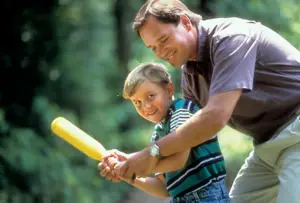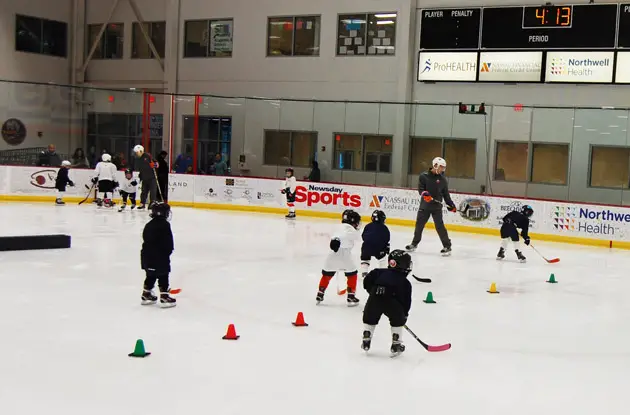 As a parent on the sidelines, it can be challenging to watch your little competitor have a tough day on the field or in the gym, not to mention seeing them be the last one picked for a team. How can a parent help a child navigate the fallout from such a disappointing experience? Remember that these heart-wrenching moments for you can also be valuable life lessons for your kids, and read on for answers from local experts to the question (you’ll see that there is a recurring theme: help your kids to enjoy their sporting activities!):
As a parent on the sidelines, it can be challenging to watch your little competitor have a tough day on the field or in the gym, not to mention seeing them be the last one picked for a team. How can a parent help a child navigate the fallout from such a disappointing experience? Remember that these heart-wrenching moments for you can also be valuable life lessons for your kids, and read on for answers from local experts to the question (you’ll see that there is a recurring theme: help your kids to enjoy their sporting activities!):
| How should I handle it when my child is frustrated or upset after a particularly bad day with sports? |
See advice from experts in the Nassau County, Long Island, area:
“Everyone at some point fails at key times, like when a team is counting on you. Younger children recover quite quickly from these types disappointments – they might cry for a moment, but then they’re wondering where they’re going to go to get their ice cream! Around the age of 10 to 12, kids are really introduced to competition. It’s important for parents to understand that kids aren’t used to competition. It’s a real rollercoaster ride.
Just because a child fails, it’s not a bad thing. Parents should stress that the athletic process is one of persistence. There will always be failure. We can give specific advice on how to improve – the mechanics of a baseball swing, for instance – but it’s more important for the child to realize that there’s always another chance for success if someone is properly prepared. So often parents don’t think to simply encourage practice. They realize that if their child takes an exam in school and fails, he needs to study more to improve. Well, it’s the same thing with athletics. Practice makes better; it doesn’t make perfect.
With parental involvement and encouragement, kids can reach great heights. Put your kids in the hands of coaches who are good role models and good people, who know how to deal with children at different ages. In my mind, that’s more important than someone who knows the ins and outs of the game.
All kids mature at a different pace. I always tell kids that it’s dangerous to be the best 12-year-old, because chances are you’re not going to be best 17-year-old when you reach high school. Even some of the kids I coach who are 21 years of age struggle with failure. But we should always remember, and remind our kids, to keep perspective: It’s just a game.
Parents must keep in mind that they can’t control what happens on the field. Sometimes they feel powerless. But they can root for their kids and be supportive, which is great. Enjoy the process of watching your child compete. Enjoy traveling to the games with your child. Parents of kids who participate in sports generally spend more time with their kids than others do – and it’s valuable, quality time. That time is worth pounds of gold. Enjoy it!”
–Bob Hirschfield, director, New York Baseball Academy, Old Westbury, NY
“I have always told my kids that no one is great – or even good – at everything, but if you don’t try you can’t find what your special thing is. No one starts out being the best at what they do. It takes practice and a desire to be better that makes the difference. And most of all, children need to have fun. We celebrated when we lost as well as when we won by pointing out the things that we did better both as individuals and as a team.”
-Kathy Brown, Boy Scouts of America district executive, Theodore Roosevelt Council, Massapequa, NY
“I think my take on addressing self esteem issues may be a little out of style these days, as many parents seem overly concerned about their children never having to deal with disappointment. Part of maturing in youth, in my opinion, is learning how to give and take, and understanding that dealing with day-to-day disappointments is simply part of the everyday flow of life. Learning to deal with adversity is part of growing up.
My husband and I raised three sons, and how they felt was very important to us. We would discuss with them their bad days, their lost games. Always try to focus on the big picture. Every child has talent – if basketball isn’t it, maybe it is golf, or computers, or art. The key, in my thinking, is to teach kids to try their hardest and to accept that they have strengths and weaknesses. Every day isn’t going to be ‘their’ day – but they should be proud that they gave it their all.
One of my sons was small for his age but a good athlete. He was constantly underestimated because of his size until the coach or team saw him play. He showed them! He was never happy about being small but he learned to use it to his advantage. My advice for parents would be to listen and discuss. Be ever-mindful that everyone has strengths they might not be fully aware of, so sometimes we need to gently point them out. To parents and kids: Don’t sweat the small stuff!”
-Donna Scott, assistant director, LuHi Summer Programs, Brookville, NY
Do you have kids heading off to summer camp? Learn how to deal with the inevitable separation anxiety, and find other great advice from experts in your area at NYMetroParents.com/AskTheExperts.





















